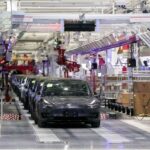
Tariff War Tensions Rise as Xi Urges EU Unity Against U.S. Policies
In a world shaken by economic shifts, the tariff war between the United States and China has taken another dramatic turn. During a recent meeting in Beijing, Chinese President Xi Jinping called on the European Union to unite with China against what he described as “unilateral acts of bullying.” This pointed remark was clearly aimed at U.S. President Donald Trump’s escalating tariff measures.
A New Chapter in the Tariff War
President Xi made these remarks while meeting Spanish Prime Minister Pedro Sanchez. It was Xi’s first public response since Trump raised import duties on Chinese goods to a staggering 145%. China quickly hit back, slapping 125% tariffs on American imports.

The tariff war, which began as a dispute between Washington and Beijing, is now pulling in global powers like the EU. Xi emphasized that there are “no winners in a tariff war,” a sentiment echoed by Sanchez, who added, “Trade wars aren’t good – the world needs China and the U.S. to talk.”
EU Caught in the Crossfire
The European Union is now in a tricky spot. Trump had initially imposed tariffs on dozens of countries, including EU nations, but has paused them for 90 days. The EU has temporarily shelved its own retaliatory tariffs, hoping to negotiate a more stable outcome.
Sanchez believes the European Commission must use this window to strike the best deal possible. At the same time, he is pushing for a balanced trade relationship with China, where the EU currently faces a $300 billion trade deficit.
Also Read: China Seeks Allies to Counter U.S. Tariffs in Bid to Pressure Washington
Strengthening Sino-Spanish Ties
Sanchez’s visit to China, his third in recent years, is part of Spain’s broader effort to deepen ties with Asia’s largest economy. He hopes Spain can act as a bridge between China and the EU while also attracting Chinese investment in key sectors like energy, tech, and smart cities.
During the trip, both nations signed agreements on science, education, technology, and even pork and cherry exports. These sectors represent growing opportunities for collaboration, especially in areas where Europe lags behind China—such as batteries, electric vehicles, and hydrogen technologies.
Europe’s Balancing Act
Despite criticism from Washington, Spanish officials have defended their engagement with China. They dismissed U.S. warnings that aligning with Beijing could be like “cutting your own throat.” Instead, they see China’s rise as a chance to rebalance global trade.
“China should show sensitivity to Europe’s demands for more balanced relations,” Sanchez said. The EU, after all, sees China as a partner, competitor, and rival—all at once.
Xi, for his part, welcomed the partnership and called for greater cooperation in a “multipolar world.” He reiterated China’s support for EU unity and its commitment to a rules-based global trade system.
Also Read: Australia Snubs China’s ‘Join Hands’ Plea Amid Rising US Tariffs
The Bigger Picture
The current tariff war is not just about economics. It is reshaping alliances, testing diplomacy, and affecting everything from food exports to high-tech manufacturing.
With major economies like China and the EU seeking alternatives to U.S. policies, the world may be entering a new era of trade politics—one defined more by cooperation than confrontation, if leaders can find common ground.
Also Read: China Labels U.S. Tariffs ‘Economic Bullying’—The Tension Heats Up












